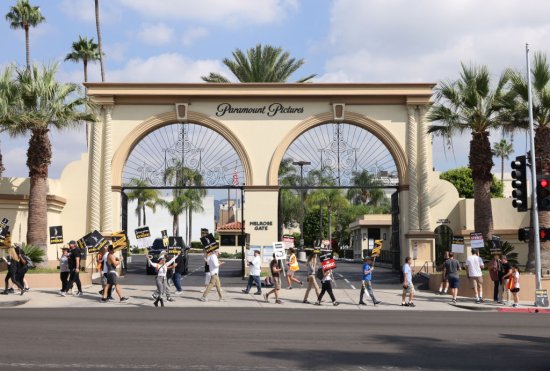
While voters may not have power over the titans of industry, workers do, writes Adam Conover.
Income inequality is at historic highs. Tens of millions of working-class Americans can’t afford a home, medical care, or an education for their children. And we live under a political system run by the wealthy, in which average citizens hardly get a say. How do we solve these seemingly intractable problems?
Recent events in Hollywood might provide an answer. And no, I’m not talking about a CGI-empowered superhero from a Marvel movie coming to our rescue—I’m talking about the seismic victory my union, the Writers Guild of America, just won in its battle with the studios.
[time-brightcove not-tgx=”true”]
Over the past few years, the massive streaming companies that employ us have turned the entertainment industry into a microcosm of American inequality. They’ve reduced our wages, eroded our working conditions, and made it impossible for middle-class writers to build a stable life. When we demanded change, they refused. So we did what union members do: we went on strike, grinding the wheels of our industry to a halt, and we let the CEOs know they would not earn a single penny more off our labor until they conceded to our demands.
Read More: 2023 Is a Year of Worker Strikes
First, they ignored us, claiming that they had a plan to starve us out. Then they raged at us, angrily insisting that we take a barely improved, insufficient offer. But eventually, after 148 days, they bent, then broke, and every proposal that they told us five months earlier was too costly, too unprecedented, too disruptive to ever consider is now inked into our contract. These provisions—among them, protections from A.I. and a first-ever, success-based residual in streaming, ensuring that writers who create hit shows and movies will participate in the profits they generate—will protect writers for generations to come.
Why did we win? Simple: because workers have power, if we choose to use it.
The Writers Guild is a democratic union that runs on member power. It’s we, the members, who decide which issues to fight for. And it’s we, the members, who force the companies to bend by collectively withholding our labor.
For 50 years, unions across America used the tools of democracy and member power to win gains for workers across the economy. They raised wages, made workplaces safer, and created the American middle class. Workers gained so much power, they could literally force the titans of industry to cut everyday Americans in on their profits.
But since the 1980s, aggressive corporate union-busting has pushed union membership to record lows, and many of the unions that remain have stopped using the old weapons. Instead of democracies, they’re run by unelected leaders from the top down, and instead of member power, they rely on donating and lobbying political leaders for favors. The result has been a historic decline in real wages, skyrocketing inequality, and the complete shutting out of the average worker from American political life.
Now, however, the pendulum appears to be moving in the other direction, and not just in Hollywood. In the car industry, the United Auto Workers have launched a massive strike against the Big Three automakers, and this month, 75,000 healthcare workers went on strike against the Kaiser Permanente hospital chain. These workers aren’t just fighting for better profits for themselves; they’re fighting for better conditions for their patients, and greener jobs for our transportation system.
Most importantly, though, they’re fighting to have a real and impactful say in how our country runs. After all, it’s not just politicians who control what happens in America—it’s the CEOs who stalk from boardroom to boardroom in private planes, deciding the fates of millions. But while voters may not have power over the titans of industry, workers do. If we act collectively and fight for our common needs, we can force them to make a change, and create a more equitable, fairer, and prosperous country for all of us. And that’s a story that may have been written in Hollywood, but it’s the workers of America who will act it out.
Conover is a writer, comedian, and television host. He served on the WGA negotiating committee and is a member of the 2023 TIME100 Next list.